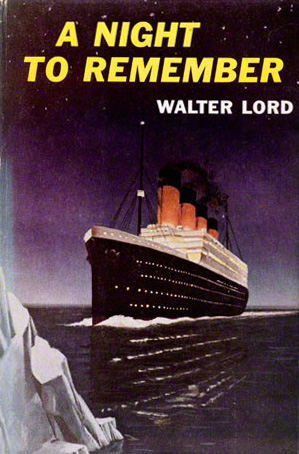"A Night to Remember," indeed

No significant book about the Titanic disaster had appeared by the 1950s, save for several memoirs written by various survivors and other participants in the epic tragedy. But in the year 1955, a book titled A Night to Remember hit book stores and book clubs everywhere. Drawing on a vast amount of original research ranging from inquiry transcripts to survivor interviews, Walter Lord brought the disaster to stunning life.
Lord begins his narrative with Frederick Fleet high up in the Titanic's crow’s nest keeping a sharp watch for ice along with fellow lookout Reginald Lee. He closes his narrative with Titanic survivor John B. Thayer Jr. climbing into a bunk aboard the rescue ship Carpathia to get some much-deserved sleep after a harrowing escape.
In between these two individuals, Lord deftly tells the stories of dozens more. All of it told in a "minute-by-minute" style that gave the book a novelistic intimacy lacking in most history books. This, in no small part, was due to Lord being as much a writer as he was a freelance scholar. He instinctively knew how to make his retelling a gripping read, not a dull tome. And his choice of a title was marvelous poetic yet appropriate. The disaster happened entirely at night. Daybreak only caught the grim aftermath as the last of the Titanic's lifeboats approached the Carpathia.
Unfortunately, some "academic" scholars have sneered at Lord's book. Harvard professor Steven Biel all but trashed Lord's book in his "cultural history" tome Down with the Old Canoe as a mere work of "popular history" that pandered to the "nascent nuclear anxiety" of the America of the 1950s. Say you say what, Professor Steven Boring? Lord was simply telling a story. It was a story that had gripped him from a young age, thanks to family lore about his mother sailing with Captain E.J. Smith once upon a time and a boyhood crossing on the Titanic's sister ship Olympic. Professor Biel can take the biased text of Canoe and eat it for all I care. Historians like Biel make history dull and boring; historians like Lord make it exciting and interesting. This -and this alone- explains why A Night to Remember was a huge best-seller when first published and has stayed in print ever since.
You said it, Walter. The loss of the RMS Titanic was indeed a night to remember.
If you ever need to read just one book on the Titanic disaster, A Night to Remember is it.
Article image courtesy Wikimedia.
1 comments